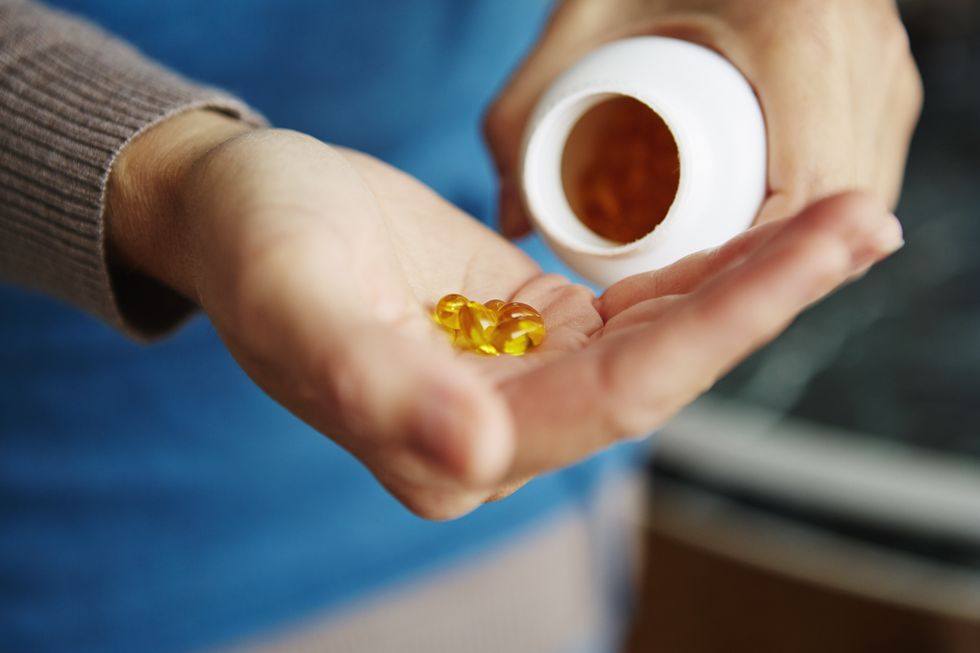SHOPPING — All products are independently selected by our experts. To help us provide free impartial advice, we will earn an affiliate commission if you buy something. Click here to learn more
Getty Images
- Mice given vitamin D had enhanced immunity against cancer
- The vitamin acted on the cells of the rodents' intestines
- The link between vitamin D and cancer in humans is inconclusive
- Britons are advised to take vitamin D supplements
Don't Miss
Most Read
Trending on GB News
New research has found a possible link between vitamin D and improved immunity to cancer. A study in mice found that the vitamin encourages the growth of a type of gut bacteria which gives the animals better immunity to the disease.
- View Deal | Get a one-year supply of Vitamin D tablets from Amazon
- View Deal | Get 96 maximum strength Vitamin D tablets from Holland & Barrett
The researchers found that mice given a diet rich in vitamin D had better immune resistance to experimentally transplanted cancers, and improved responses to immunotherapy treatment.
Caetano Reis e Sousa, head of the Immunobiology Laboratory at the Francis Crick Institute, and senior author, said: “What we’ve shown here came as a surprise – vitamin D can regulate the gut microbiome to favour a type of bacteria which gives mice better immunity to cancer.

The researchers were surprised to find that vitamin D acts on specific cells in the intestine
Getty Images
Caetano Reis e Sousa, head of the Immunobiology Laboratory at the Francis Crick Institute, and senior author, said: “What we’ve shown here came as a surprise – vitaminD can regulate the gut microbiome to favour a type of bacteria which gives mice better immunity to cancer.
“This could one day be important for cancer treatment in humans, but we don’t know how and why vitamin D has this effect via the microbiome.
“More work is needed before we can conclusively say that correcting a vitamin D deficiency has benefits for cancer prevention or treatment.”
- View Deal | Get a one-year supply of Vitamin D tablets from Amazon
- View Deal | Get 96 maximum strength Vitamin D tablets from Holland & Barrett
The researchers were surprised to find that vitamin D acts on specific cells in the intestine, which in turn increase the amount of a bacteria called Bacteroides fragilis.
According to the findings, the tumours did not grow as much, suggesting that the microbe gave mice better immunity to cancer.
How the researchers gathered their findings
In order to test if the bacteria alone could give better cancer immunity, mice on a normal diet were given the bacteria.
These mice were also better able to resist tumour growth but not when the mice were placed on a vitamin D-deficient diet.
Although there has been no conclusive evidence, previous studies have proposed a link between vitamin D deficiency and cancer risk in humans.
To investigate this, the researchers looked at a dataset from 1.5 million people in Denmark, which highlighted a link between lower vitamin D levels and a higher risk of cancer.
A separate analysis of a group of people with cancer also suggested that people with higher vitamin D levels were more likely to respond well to immune-based cancer treatments.
Bacteroides fragilis is also found in the microbiome of humans, but more research is needed to establish whether vitamin D helps provide some immune resistance to cancer through the same mechanism.
Evangelos Giampazolias, former postdoctoral researcher at the Crick, and now group leader of the Cancer Immunosurveillance Group at the Cancer Research UK Manchester Institute, said: “A key question we are currently trying to answer is how exactly vitamin D supports a ‘good’ microbiome.
“If we can answer this, we might uncover new ways in which the microbiome influences the immune system, potentially offering exciting possibilities in preventing or treating cancer.”
Research Information Manager at Cancer Research UK, Dr Nisharnthi Duggan said: “We know that vitamin D deficiency can cause health problems, however, there isn’t enough evidence to link vitamin D levels to cancer risk.
“This early-stage research in mice, coupled with an analysis of Danish population data, seeks to address the evidence gap.
“While the findings suggest a possible link between vitaminD and immune responses to cancer, further research is needed to confirm this.
LATEST DEVELOPMENTS

There isn’t enough good evidence to link low levels of vitamin D (vitamin D deficiency) to cancer
PAEditor's take
The new research is encouraging as we attempt to fight a disease that remains a leading cause of death worldwide.
However, it's worth emphasising that the study was conducted on mice and research into the link between vitamin D and cancer in humans is inconclusive.
For example, most randomised controlled trials have found that vitamin D supplements, with or without calcium, do not reduce the risk of developing cancer overall or of developing specific cancer.
I would defer to Cancer Research UK on this one: "There isn’t enough good evidence to link low levels of vitamin D (vitamin D deficiency) to cancer."
That is not to say supplementing with vitamin D and getting enough it in your diet is not important.
Vitamin D helps regulate the amount of calcium and phosphate in the body. These nutrients are needed to keep bones, teeth and muscles healthy.
A lack of vitamin D can lead to bone deformities such as rickets in children, and bone pain caused by a condition called osteomalacia in adults.
Everyone in Briton is advised to take a daily vitamin D supplement during the autumn and winter.
For people who are dark-skinned, and for those who spend a lot of time indoors and are over 50, all year-round supplementation is recommended.








